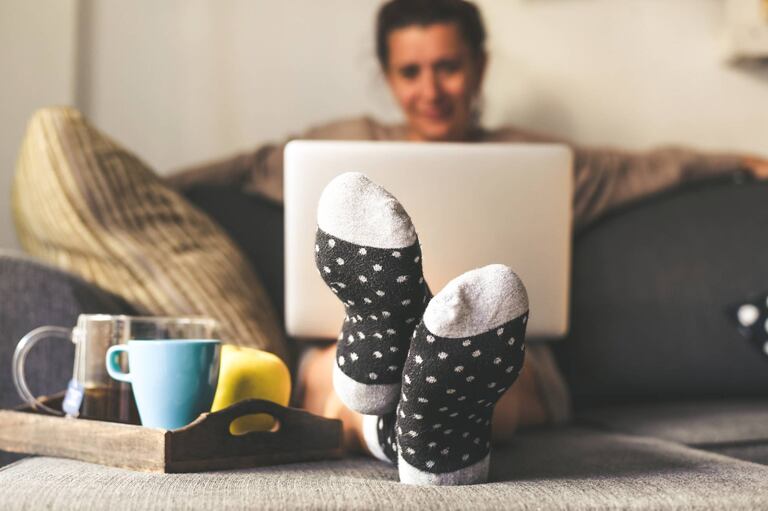Dressing as if you were going to work outside the home can help reduce energy use.
A priori, the answer to this question would be no.
It sounds logical that, if you spend more time at home, consumption increases, bills soar, and making ends meet becomes more complicated.
However, it is possible to spend less.
To do this, you have to change some habits, learn others and know how to prioritize.
Reducing uncontrolled consumption is everyone's responsibility.
Now we are more aware that the misuse of energy affects our present and our future.
The use of electrical energy has increased during the pandemic and it is essential to consume energy efficiently.
Now more time is spent at home and it is necessary that the bill does not increase.
For this, some basic measures can be taken to optimize consumption.
These are the new energy labels for televisions and appliances that go into effect on March 1
1. Have equipment in adequate condition
Consumption increases when power dissipates uncontrollably.
For this reason, boilers, heaters, thermoses and any other heat production equipment must be in optimal condition.
Passing the revisions recommended by the manufacturer and maintaining the equipment helps reduce consumption.
2. Control schedules
Working from home can turn days into endless hours.
Respecting the hours that an office would have helps to schedule and optimize consumption.
Dressing the same as if you were going to work outside the home helps.
The thermal comfort of the clothes reduces the demand for heating and allows you to be in a pleasant environment without requiring more consumption.
At the end of the working day, all equipment must be turned off: computers, chargers, small appliances.
In addition, thieves, multi-plugs and small appliances consume power even in dormant mode.
You have to completely turn off what is not going to be used.
In this way, long involuntary consumptions are avoided.
3. Efficient lighting, rational lighting
LED light and energy saving bulbs are a good investment because they have a longer life and lower consumption than traditional ones.
It is better to turn each room on and off depending on whether it is being used or not.
Leaving spaces on may give a feeling of security and warmth, but it also increases consumption.
Natural lighting should be used to the maximum to reduce the hours of lighting of lamps and bulbs.
Draw curtains and blinds in times of sunlight and during the day, and turn on lights as the sun goes down.
Home automation can be a great energy saving tool.
Home assistants like Alexa or Google Home can help you schedule home appliances on and off.
4. Ventilate at times of lower consumption
If air renewal already guarantees a healthy environment, the current situation derived from covid-19 forces the interiors to be ventilated more frequently than ever.
The entrance of outside air reduces the risk of contagion, but in winter the air is especially cold, so it is important to combine safety and savings.
To avoid heat loss, try to ensure that the ventilation does not coincide with the times of greatest heating consumption or colder outside.
The windows are better to open for shorter periods (increasing the frequency).
5. Learn to use the most consuming equipment
Appliances like the oven, dishwasher or dryer use a lot of energy in a short time.
For this reason, it is better to use them in
eco
programs
and at full load so that the times and consumption levels do not increase disproportionately.
Although in principle they are more expensive, it is better for the equipment to have an energy label with a category that is as efficient as possible since they involve less electricity consumption.
Ovens, heaters and heating elements give off a lot of heat, even when turned off.
Taking advantage of that latent heat is a thermal gain in small spaces such as kitchens and bathrooms.
6. Invest in efficient windows
Heat can be lost through all the gaps.
Investing in PVC windows or those with thermal break ensure thermal comfort and optimization of consumption.
Watertight and insulated shutter boxes prevent energy dissipation above the gaps.
And blinds, curtains and blinds prevent heat from dissipating when the sun goes down.
7. Study the consumption before contracting the electricity supply
The supplying companies have savings plans, flat rates, financial aid.
Therefore, it is necessary to study the consumption well and look for the best contracting conditions.
The contracted power sometimes generates fixed costs above what is necessary.
If this factor is adjusted, the invoice will be adjusted and it will also be noticed at the end of the month.
These are just a few basic tips that can translate into concrete savings.
Increasing the time at home does not have to become an energetic lack of control.
Optimizing, regulating and adjusting the energy demand and daily habits will allow to see, in a short time, the savings in the energy bill.
Javier Martínez Moronta
is an architect specialized in energy efficiency from the International University of La Rioja.
This article was originally published in
The Conversation España
To know the most important news on Climate and Environment of EL PAÍS, sign up here for our
weekly
newsletter
.
Follow the Climate and Environment section on
and




